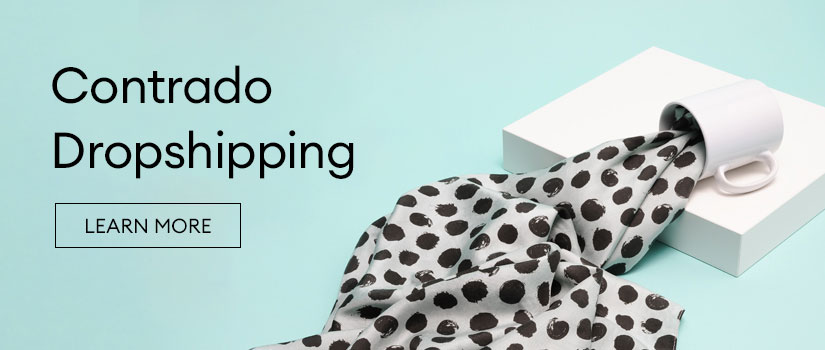Since its inception, drop shipping has made it easy for entrepreneurs to open businesses worldwide. If you can write a product description and have basic design skills, you can set up a fantastic website and start selling. The only issue is, once you have a store, how do you get the word out? How do you set up drop shipping ads that actually work?
Indeed, marketing and advertising are where many drop-shippers fall short, missing out on incredible revenue. You might have a great business plan, but you can’t do much if no one knows about it. How do you get your business out there and reach the right people?
In this blog post, we’ll show you that you don’t need to be a marketing guru to finesse your drop shipping ads. You’ll be happy to know it’s even easier than you think! Don’t believe us? Read on.
How to Advertise Drop Shipping for Total Beginners
How you set up drop shipping advertising is completely dependent on the resources at your disposal. Luckily, you can do a lot with drop shipping ads even if you have very little. Do you have some nice photos? Can you edit a short clip? What about writing a great sales pitch? All of these things can produce great advertising.
How to Prepare Your Drop Shipping Ads

There are 3 things you need to bear in mind before you’re advertising on ANY platform:
1. Your target audience
Almost every advertising platform needs to know who you’re advertising to. Have a think about who this could be. If you’re a drop-shipper selling shoes, it won’t help you much to advertise to people looking for shirts. The more target audiences you can identify, the better.
2. Your campaign goals
What are you trying to gain from this campaign? It could be more sales, brand awareness, traffic, engagement, or even more followers? These things tell advertising platforms how to run your ad, and to who. They analyze users who frequently click on ads versus those who actually buy something. If you’re looking for sales, the platform will run your drop shipping ads to people more likely to buy.
3. Your keywords
Here’s some technical jargon for you! In simple terms, keywords are words and phrases people enter into search engines to find something. Going with the example above, say you’re a drop-shipper who sells shoes with a sunflower print. There are people searching for ‘espadrilles with sunflowers’ or some variation of the phrase. It’s your job to know these phrases and target your campaigns accordingly. Read on to find out how.
Once you’ve got a clear vision for your campaign, how do you get it out there? What platforms should you run it on? Well, we’ve got you covered. Check out our 6 ways to set up drop shipping ads below.
Where to Advertise Drop Shipping?
1. Pay-per-click (PPC)

With a massive amount of online advertising, it’s no surprise that Google has its very own advertising system: ‘pay-per-click’ or PPC. Essentially, in this model of advertising, businesses pay a small fee each time someone clicks on their ad. The most popular form of PPC is sponsored search results. You know when you Google something and the first 3 results are sponsored businesses? That’s PPC, and you can do it too.
For this type of drop shipping ad, you won’t need any images or videos, just some stellar copywriting and a budget.
The way PPC works is by targeting keywords. Remember those? Now, a keyword like ‘espadrilles with sunflowers’ might be perfect for your business, but it’s also incredibly specific, so not many people are likely to search that. You might find more search volume around a keyword like ‘cute espadrilles’, ‘fashion espadrilles’, and so on.
Writing Your Drop Shipping Ads
Once you find appropriate keywords with good search volume, it’s time to create an ad. Let’s say you’re targeting with the phrase ‘cute espadrilles’. The PPC ad will read something like this:

See how the keyword is mentioned in both the title and description? This is how you target ads with a keyword. The problem is, if you’re targeting these keywords, your competitors are likely to as well.
Bidding

You and your competitors will all bid on these targeted keywords. So how do you ensure your ad shows up and gets clicks? You’ll need to make sure these 4 things are in order:
- Keyword relevance: how good is the ad itself? Is the keyword accurate to the product or service you’re advertising?
- Landing page quality: when a customer clicks through, is the landing page relevant? Does it look good? Is the content persuasive and relevant? Is the call-to-action clear & what the customer searched for?
- Quality score: this is Google’s rating of the quality/relevance of your keywords, landing pages, and PPC campaigns. Better quality scores mean more clicks & less costs.
- Creative: it’s necessary for your ad copy to create intrigue and stand out from your competitors. What unique selling points does your business offer? Fast delivery? High-quality? How does the ad stand out from others?
If these 4 requirements are met, you’ll be able to outbid your competitors and run successful PPC campaigns in no time.
2. Facebook Ads

Outside of PPC, social media is the most effective advertising tool to run drop shipping ads, and none compare to Facebook. Facebook is widely known as the most effective advertising platform because of its wide reach and variety of users. Clicks and conversions are higher on Facebook than any other social media channel.
Even if you don’t use Facebook personally, it’s an important advertising tool for your business. All Facebook drop shipping ads fall into 2 categories: photo or video. So, you’ll need some great pictures or a snappy video to run successful ads on Facebook.
After you create an account, the Ads Manager is your hub for all Facebook advertising. There, you can set up, run, monitor, and create new ads. The structure of the Ads Manager is like a pyramid.
Pyramid of Drop Shipping Ads on Facebook:
Top: Campaigns
Middle: Ad sets, which make up campaigns
Bottom: Ads, which make up ad sets & run actively on Facebook
So, for example, let’s say you’re running a campaign on your fantastic espadrilles! The entire campaign might be called something like ‘Espadrilles Campaign’. Your ad sets might be: ‘High-quality espadrilles’ where you focus on the quality, and ‘Fashionable espadrilles’ where you focus on the design. Within the ‘High-quality espadrilles’ ad set, you may have ads like the following:

3 Tips for Successful Drop Shipping Ads on Facebook

Unlike PPC, you don’t need to bid on keywords, but you do still need to bid on a placement over your competitors. Like PPC, there are a few traits to ensure your campaign is successful:
1. Know your objective
Because Facebook is a social media, your objective may or may not be sales-related. Maybe you want more followers or local awareness of your business. The objectives you could choose are as follows: brand awareness, local awareness, reach, traffic, engagement, app installs, video views, lead generation, conversions, product catalog sales, store traffic, or messages.
2. Target your ads based on interest
One unique aspect of Facebook drop shipping ads is you can target ads based on interest. Facebook likes are a goldmine for drop shipping advertising. An obvious example, if you’re a travel accessory drop-shipper, is to target people with an interest in travel. Along with this, you could target people with an interest in different airlines, people who like various popular travel destinations, or users who like big name travel brands.
3. Make sure they’re visually appealing
Unlike PPC, all Facebook ads are photo or video-based, so you need to feature one of these along with some copywriting. If you go the route of a photo-based ad, ensure that your unique selling points are mentioned (high quality, fashionable prints, made of canvas fabric, etc.) and the call to action is clear. The call to action could be ‘Shop now!’, ‘Browse espadrilles’, ‘Learn more’ or something similar.
Other Things to Know About Facebook Ads

If you’re developing a photo or video ad for Facebook, you can use it for Instagram too! Instagram is included in Facebook’s Ad Manager, so you can easily run ads on both platforms with one tool. If you’re on the fence about learning some graphic design skills, it might be worth the investment. One ad can go a long way.
Plus, the world of Facebook advertising extends even beyond ads! Many drop-shippers take advantage of Facebook groups and forums to promote their product. Facebook groups are steadily rising in popularity. They’re private communities full of people who share a common interest. The communal, safe environment a Facebook group creates is the perfect breeding ground for customers sharing word-of-mouth.
If you’re a small business owner, it’s worth finding groups that are relevant to your business. Like an espadrilles enthusiast group. Or create your own!
3. Instagram Ads
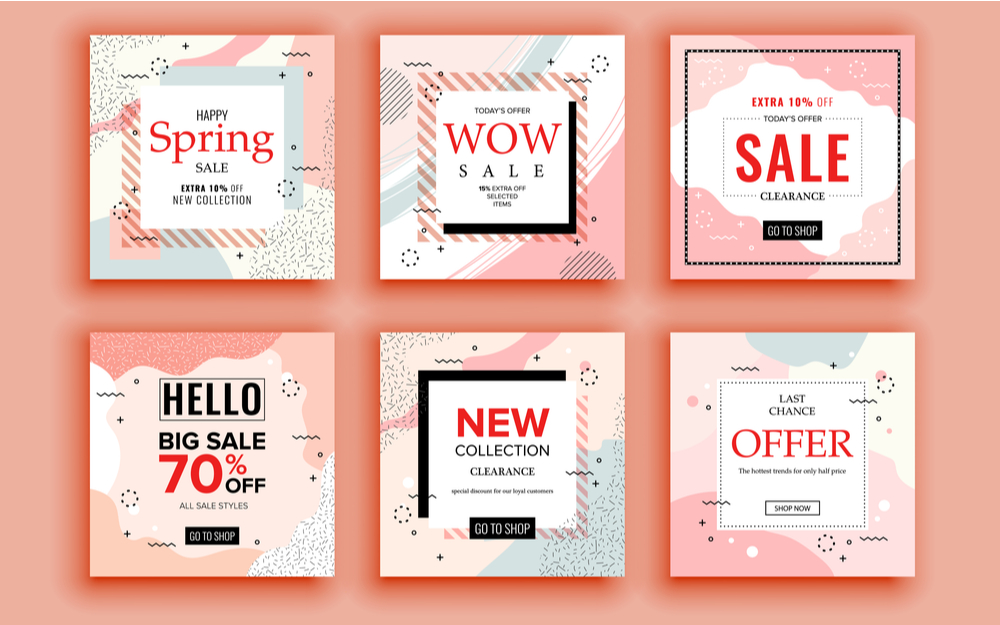
Another great advertising platform for drop shipping ads, Instagram is great for engagement: even with a small audience, you’re likely to still get likes, comments, follows, views, and so on. Instagram is a fantastic tool for brand identity, brand awareness, and cultivating a community. And, thanks to product tagging and the new in-app Shop tab, your followers can get from ad to check out in just a few taps.
Before these features, drop shipping advertising on Instagram was limited to influencer marketing with sponsored posts. This is still prevalent on the app, but its drawbacks can often outweigh any benefits. It requires negotiating, is often expensive, and influencers are not held accountable if they don’t deliver.
But now, by using Facebook’s self-serve advertising platform, anyone can learn to run Instagram ads directly from their account. Like Facebook, Instagram utilizes visual advertising, so you’ll need images and videos to create ads for Instagram’s platform. There are 5 types of Instagram drop shipping ads.
Instagram Ad Types
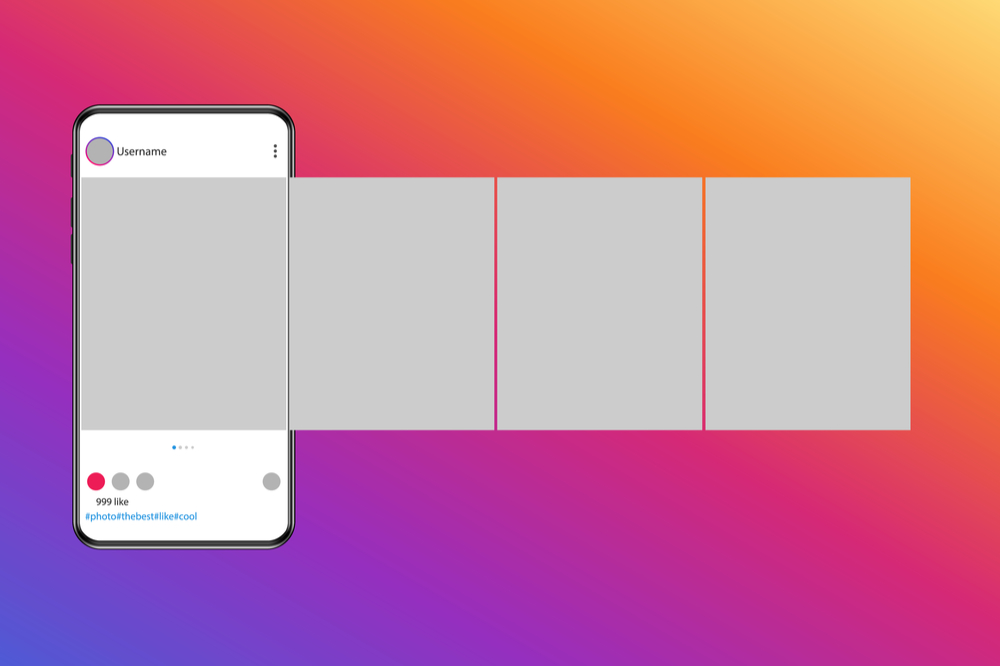
1. Photo ads
The simplest of Instagram ads, this type of advertisement only requires a single photo. These can be in landscape, portrait, or square orientation. Businesses often feature a single product in a photo ad and link it to the product page. An effective, simple sales segway from ad to checkout.
2. Video ads
Instagram video ads can be up to 60 seconds long in either square or landscape orientation. Like the photo ad, it features a single video. Businesses often use a split-screen that is partially video and partially text to promote memberships, deals, or an in-depth view of a single product.
3. Carousel ads
These can have anywhere between 2 to 10 images and/or videos that users can swipe through. Each image or video has its own caption that changes with each swipe. Carousel ads are great for featuring your product range or different versions of one product. Each image or video has a call to action at the bottom.
4. Slideshow ads
Like video ads, slideshow ads, appear as a video in the user’s feed. The difference is that slideshow ads feature a series of still images that play as a video, similar to a slideshow. You can add text and audio to your slideshow ads to make them even more engaging. They have similar benefits to carousel ads.
5. Story ads
These are the newest kind of Instagram drop shipping ads, which play as a user scrolls between stories. Businesses can share ‘self-destructing’ photos or videos that last for a limited amount of time, and disappear to the next story in the queue. Story ads are placed strategically between stories from the user’s following, so appear more friendly and local. They are great for building brand awareness and ad recall.
You can run Instagram ads on the same platform as Facebook: your Ads Manager. Once you’ve mastered Facebook advertising, move onto Instagram next!
4. Twitter Ads

Twitter exists in a league of its own with advertising. Unlike Instagram, it is not linked to Facebook’s Ad Manager, so it has a unique advertising atmosphere. Like Instagram, Twitter is great for building brand awareness, identity, and community with your customers. Twitter is also a great tool for influencer marketing.
Here are some of the ways you can run drop shipping ads on Twitter:
- Sponsored tweets: you can pay popular accounts to tweet about your business or product & link back to you.
- Twitter card: this tool tweets an ad consisting of an image & call to action. When people click this, their name and email are saved so you can compile a mailing list.
- Campaigns: similar to Instagram and Facebook, you can run ads on Twitter as part of a campaign using images and videos. You set a budget for how much you’d like to spend and a timeframe for how long the ad will run.
- Advanced Search: this tool allows businesses to search for topics that people are talking about. This way, businesses can join the conversation, catch people’s attention, and increase their following and engagement.
For a complete list of how to advertise on Twitter, check out our blog post about Making Money on Twitter.
5. YouTube Ads
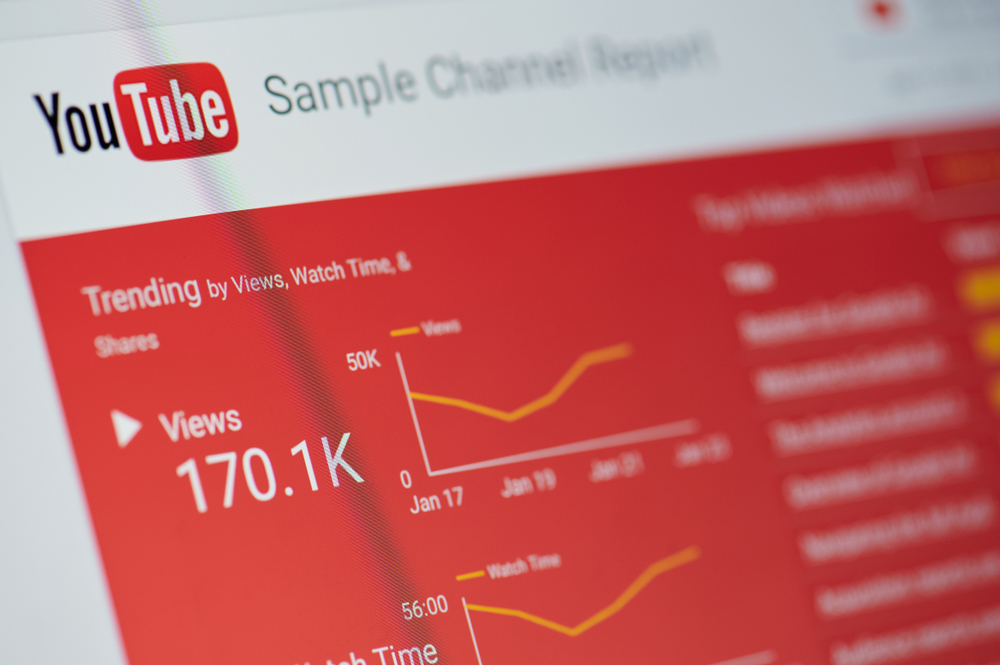
The grand finale: YouTube drop shipping ads! These ads are the most expensive and require the most expertise to run, but they’re still worth knowing about as a small business owner. As your business grows, more advertising possibilities open up, and YouTube ads are one of them.
Video advertisements are a proven method of gaining revenue, and YouTube ads perform best by far. The amount of daily YouTube visitors is the main reason why it’s so expensive, and also the way you advertise is completely different.
Bidding

YouTube ads use a bidding system like other advertising platforms, but it’s completely based on your campaign’s objective. You either pay the cost-per-view (CPV) or cost-per-acquisition (CPA). Acquisition takes into consideration the traffic generated & revenue produced by the ad. There are 4 types:
- Leads campaigns (to generate leads & sign-ups – great for subscription services) – CPA
- Brand awareness and reach (to generate awareness of your business or new product) – CPV
- Product and brand consideration campaigns (to generate awareness of your products and niche) – CPV
- Website traffic campaigns (to generate more visits to your website) – CPA
Types of YouTube Drop Shipping Ads
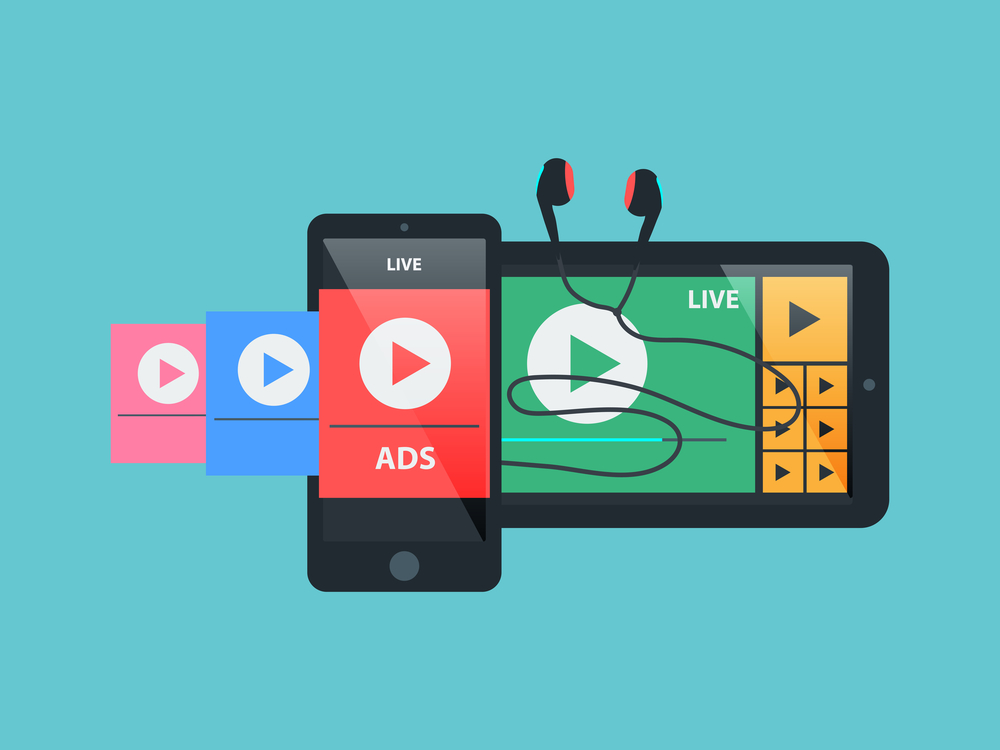
Once you know your campaign’s objective, there are 5 different ads you can run: bumper, pre-roll, TrueView, overlay, and sponsored cards. The first three are all ads that play before, during, or after a YouTube video. Short, un-skippable ads are either bumper or pre-roll, whereas longer, skippable videos are normally TrueView.
Then you have overlay ads and sponsored cards. Overlay ads are those little banners that display at the bottom of YouTube videos. Sponsored cards exist in the little ‘i’ icon on the top right-hand side of a YouTube video. If a product of yours is mentioned in a YouTube video, the viewer can click the ‘i’ icon and immediately start browsing that product and similar ones, too.
YouTube drop shipping advertising is a vast, complex world, but when done correctly can produce massive results. Once you’ve got the funds to spend on advertising, YouTube ads can take your business to the next level.
How to Advertise Drop Shipping: The Complete Guide
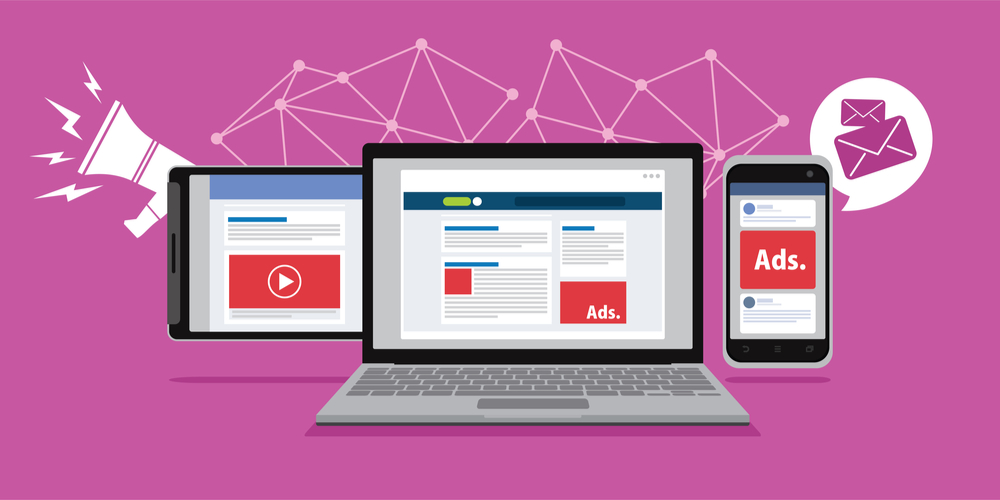
And now you know everything you need to know about drop shipping advertising. It’s a fine art, and the only way to improve is to get started and continuously tweak your campaigns. Trial and error is the best method for producing successful drop shipping ads.
And, whether you’re a drop-shipper selling shoes, travel accessories, homeware, or t-shirts, you can expand your product range for free with amazing quality items using Contrado’s drop shipping service. We’re a print-on-demand company with 450+ products to choose from, but we’re a bit different from other drop shipping services. Click below to learn more.
